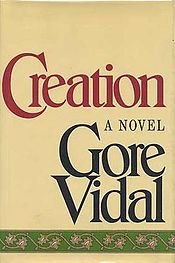- Creation (novel)
-
Creation
1st edition coverAuthor(s) Gore Vidal Country United States Language English Genre(s) Historical novel Publisher Random House Publication date 1 January 1981 Media type Print (Hardback & Paperback) Pages 510 pp (first edition, hardback) ISBN ISBN 0-394-50015-6 (first edition, hardback) OCLC Number 7158597 Dewey Decimal 813/.54 19 LC Classification PS3543.I26 C7 Creation is an epic historical fiction novel by Gore Vidal which was published in 1981. In 2002, he published a restored version, adding four chapters that a previous editor had cut. He also added a brief 2002 foreword explaining what had happened to the book in its original version and why he restored the cut chapters.
Plot summary
The story follows the adventures of a fictional "Cyrus Spitama", an Achaemenid Persian diplomat of the 5th century BC who travels the known world comparing the political and religious beliefs of various nation states of the time. Over the course of his life, he meets many influential philosophical figures of his time, including Zoroaster, Socrates, the Buddha, Mahavira, Lao Tsu, and Confucius.
Cyrus, who is the grandson of Zoroaster and who survives his murder, grows up at the Achaemenid court as a quasi-noble, and becomes a close friend of his schoolmate Xerxes. Because of Cyrus' talent for languages, the Achaemenid King, Darius I, sends him as an ambassador to certain kingdoms in India, but Cyrus is more interested in the many religious theories he encounters there than in establishing profitable trade relations for Darius. After coming to power, Cyrus' former schoolmate, now King Xerxes I, sends Cyrus to China, where he spends several years as a captive and "honored guest" in one of the warring states of the Middle Kingdom, and spends a great deal of time with Confucius. Upon returning home, Cyrus witnesses the defeat of Xerxes and the end of the Greco-Persian wars. Cyrus then goes into retirement, but is called upon by Xeres' successor, Artaxerxes I, to serve as ambassador to Athens and witness to the secret peace treaty between Pericles and himself.
The story is related in the first person as recalled to his Greek great-nephew Democritus. Cyrus recollection is said to be motivated in part by his desire to set the record straight following the publication by Herodotus of an account of the Greco-Persian wars.
Major themes
Vidal evokes a theme which Robert Graves had previously explored, a skepticism of the reported facts and interpretations of our understanding of History as reported by the winners of its battles. The story features a rather amusingly sarcastic treatment of the pretensions of the glory of Classical Golden Age of Athens. In the parts of the book that comment on history, Vidal makes obvious use of the Histories of Herodotus.
As noted in Vidal's own introduction, it can be considered a "crash course" in comparative religion, as during the story, the hero sits down with each of the religious/philosophical figures (apart from Socrates) and discusses their views.
Historical significance & criticism
The era which Vidal covers in this novel has been referred to by some historians as the Axial Age. In Vidal's story, Darius is portrayed as a usurper who murdered King Cambyses and stole the throne from the rightful heir, Prince Smerdis, in collusion with Queen Atossa. This account of Darius's ascension is subject to some historical dispute outside of the novel.[dubious ] There is also a lot of speculation about the identity of the character in the court of Ch'in known only as Huan, Whether he is a reference to the later Legalist Prime minister of Ch'in, Shang Yang or some other unknown historical figure. The figure usually given credit for the founding Legalism, Han Feizi was born much later than the book is set.
Vidal's fictional protagonist, "Cyrus Spitama" is portrayed as the grandson of Zoroaster, and a contemporary of Xerxes - which would have made Zoroaster a contemporary of Cyrus the Great or even Cambyses. However, most historians today believed that Zoroaster lived centuries before any of the Achaemenid kings. It is also unusual that Cyrus Spitama (who bears the same surname as Zoroaster) was an ambassador and a nobleman rather than a priest - the Zoroastrian priesthood was hereditary, and anyone bearing the Spitama name would be in high demand as a guardian of a fire temple. This issue is however dealt with throughout the novel, explained by the character's own attitudes and decisions. In reality, there is no record of Zoroaster's family having survived into the Achaemenid era. The central character, Cyrus Spitama, is intentionally a fictional construct and not based on a real historical figure.
Categories:- 1981 novels
- Historical novels
- Novels by Gore Vidal
- Novels set in Ancient Persia
- 1980s novel stubs
Wikimedia Foundation. 2010.

